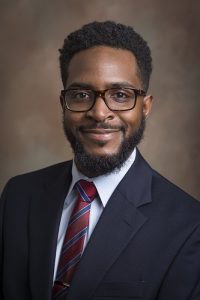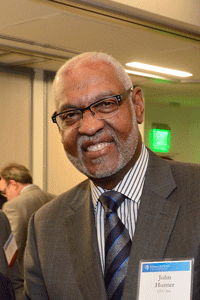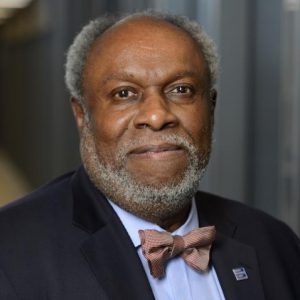Johns Hopkins UniversityEst. 1876
America’s First Research University

In 2010, Cyrus Green, Bus ’11 (Cert), ’13 (MBA), was looking to start a new chapter in his career and go from the “doer in engineering to the leadership side of engineering.”
At the recommendation of friends, he got in touch with a recruiter at the Johns Hopkins Carey Business School, who suggested a nationally recognized certificate program to prepare him for that change: the Leadership Development Program (LDP).
From 1991 to 2013, LDP gave working professionals in Virginia, Washington, D.C., and Maryland identifying as Black, Native American, Latino, and Indigenous the needed tools to advance their careers when they’ve hit a glass ceiling. Early and mid-career students in the program attended all-day classes every Saturday for nine months where they learned management, communications, and business strategies to apply to their full-time jobs the coming Monday.
“It was intense but well worth it,” says Green, adding his classes anticipated the larger conversations he finds in boardrooms today, such as considering business ethics and thinking with a global perspective. “The academic program helped me think about things more holistically. And, not even a couple years later after I graduated, we were talking about environmental and social justice issues in business.”
The classes also created a much-needed space for candid conversations about the intersection of race, gender, and workplace politics.

Carey Advisory Board member John Hunter saw this need for accessibility first-hand when he spoke to LDP students in 1991 as then-senior vice president at Citibank. They asked about how to introduce yourself to the president of your company, how to have co-workers listen to your ideas, and how to ask for a promotion — questions that caught him off guard in the moment but didn’t surprise him in hindsight.
“It highlighted to me a lack of mentorship in these large corporations. Most of these students have been at the top of their class all their lives and have now hit a roadblock where just being smart doesn’t take them where they need to go. But they don’t have many people that look like them at senior levels in their organizations, and they don’t know how to find out the unspoken cultural rules in an office without the fear of that conversation backfiring,” says Hunter.
Having that open dialogue in a space with other rising leaders with shared perspectives proved to be the “secret sauce” of LDP and created a tight-knit community.
“You bonded a lot with the yearly cohort. We found opportunities to connect outside of class, and we stay in contact to this day,” says Green.
It was someone from his cohort, in fact, who gave him the confidence to pivot into the financial industry. Green is now vice president of business resilience at investment firm T. Rowe Price and sits on the board of two environmental-based nonprofits.
The Leadership Development Program was a proven talent pipeline for advancing professionals from underrepresented backgrounds into leadership positions, with a network of 550 alumni, like Green, going on to work at companies such as BGE, Black and Decker, QVC, Hilton, Verizon, and USAA, as well as federal and state government, and nonprofits. But in 2013, the program had to close as tuition assistance resources dwindled at companies in the wake of the 2008 financial crisis and students were unable to pay the tuition necessary to keep the program afloat.
The issues that LDP addressed, though, remained. And while Hunter and the network of LDP alumni continued to build up the Carey school’s diversity programing — including the Leading a Diverse Society mentorship program — anticipation for a relaunch of LDP continued for the next decade.
“The killing of George Floyd was a tipping point where companies realized, ‘We assumed that things were okay, and obviously they’re not,’” says Hunter. “You’ve got to have a pipeline to develop future diverse leaders, and this program is a link in that chain.”

In answer to that call for more diverse and inclusive leadership, LDP opened applications for a new generation of young professionals to begin classes in September 2022. And thanks to passionate advocates like Hunter — who has created the Hunter Family Fellows to cover the full tuition for five applicants — as well as endowed funding from companies, there are increasing opportunities for scholarships to support students who might not otherwise have the means to go through the program.
The new curriculum carries forward many of the same lessons from the program’s first iteration, but in a landscape where they are even more valued than before.
“The world is more dynamic around DEI and global development than it was when we paused,” says Professor James Calvin, who returns to the program as its director and faculty lead.
This relaunch, says Calvin, utilizes distance learning tools like Zoom to welcome students from across the continent and even overseas, emphasizing the program’s original goals of promoting global thinking and talent. It augmented by two four-day, in-person residencies. Students will also be able to tap into a strong alumni network from the program’s first iteration, who will come in to share their experiences with new cohorts.
“My goal for this relaunch is to build on the foundation we started,” says Calvin. “We don’t want to reconstruct the past, but we do want to build the future.”
Want to support students from underrepresented groups advance their leadership skills?
Topics: Corporations, Students, Carey Business School, Strengthening Partnerships, Support Scholars